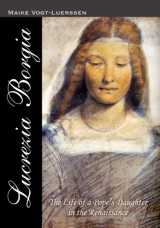Lucrezia Borgia – The Life of a Pope's Daughter in der Renaissance
with family trees and 78 figures (37 of which are in colour)
at amazon.com for US$ 10.86
at amazon.co.uk for £ 7.20


Jofré Borgia († 1437)
Isabella Borgia († 1468), the youngest sister of Pope Calixt III. (1378-1458)
mistresses:
he had some mistresses, who gave birth to his children
from mistresses, of whom we do not know the names:
from his mistress Vannozza de Catanei (1442-1518):
from his mistress Giulia Farnese (1475-1524):
The Historian Gerard Noel about Pope Alexander VI alias Rodrigo Borgia: "'The Borgia Myth' might have well been the name of an early historical crime novel – a novel to enthrall the world for all of 500 years. It is only in the last century that its veracity has been seriously called into question. Considerable damage had been done meanwhile, both to history and to the reputation of the Borgias. The myth is one of the greatest stories of all time – but myth it unquestionably is, rather than truth. The Borgias were people of their time, not ours ... It would be invidious to treat them as saints (although Lucrezia showed increasing saintliness towards the end of her life). But to treat them merely as arch-sinners shows a disrespect for historical accuracy, bordering upon outright contempt. ... In fact, there seems to have been remarkably little criticism of Rodrigo Borgia before he emerged from the conclave as Pope Alexander VI. ... It must also be said that some of the documents produced in the propaganda war against the Borgias are of questionable provenance. ... For the times he [Pope Alexander VI] lived in, Alexander's tolerance of criticism, both fair and foul, was quite amazing ... Many of the allegedly poisoned cardinals were not Alexander's enemies but, instead, his friends; conversely, many of his enemies outlived him. ... twenty-seven cardinals died during Alexander's eleven-year papacy, thirty-six cardinals died during the nine-year papacy of [Pope] Julius [II] ... Yet Alexander is regarded as a poisoner, whereas Julius is not. Surely this judgement is perverse. ... Cardinal Rodrigo Borgia is the most competent senior churchman of his time. He has managerial talents comparable to the chairman of the greatest multi-national of our own time. ... Alexander was entrusted with the sacred stewardship of the church; he served it well. Would that he had been less tolerant of the personal attacks upon himself. The vilification, which he treated good-humouredly, was used as source material for so much further calumny throughout the succeeding centuries. It has done his reputation terrible and lasting harm. ... Professor Michael Mallett on the vital effect of the hatred of Julius II on Alexander VI's reputation: 'It was this hatred which led the same Julius to torture confessions of crimes, supposedly committed at the comment of the Borgias, out of Alexander's servants, and to eradicate as far as possible every evidence of Borgia achievement.'" (in: Gerard Noel, The Renaissance Popes – Culture, power and the making of the Borgia myth, pp. 191-202).

Lucrezia Borgia – The Life of a Pope's Daughter in der Renaissance
with family trees and 78 figures (37 of which are in colour)
at amazon.com for US$ 10.86
at amazon.co.uk for £ 7.20